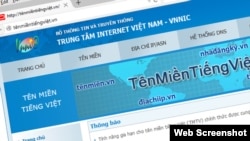For English speakers, it’s easy to take for granted opening a web browser and typing in a URL. But what do people do when their languages have Chinese characters or Vietnamese tone markers?
In a further democratization of the internet, more and more websites are popping up with domain names that don’t use the Latin alphabet. Advocates say these internationalized domain names (IDNs) add diversity to cyberspace.
“IDNs are important because they complete and support a multi-lingual internet,” said Rinalia Abdul Rahim, a board member of the Internet Corporation for Assigned Names and Numbers (ICANN). “They make the internet more inclusive for people with different writing systems around the world, and they enable local communities to come online using their own languages and scripts.”
ICANN, which profits from domain registrations, opened up the registrations to include these complex scripts in 2009. Since then, 47 country code top-level domains have been approved. That means that instead of “.com” or “.org,” newer websites can end with a label that is specific to a country and that uses non-Latin letters.
Three billion people have internet access today and 45.6 percent of them are in Asia, according to ICANN. Rinalia said Asia also will make up most of the next billion who come online by 2020. But to achieve that growth, people need the option of website names with non-traditional scripts, such as Burmese letters or Khmer numbers.
Such needs are greatest in the developing world, where English is less common.
“Due to the impact of language barriers, IDNs in local scripts are incredibly beneficial to people that don’t speak a language based on the Latin alphabet,” said Phonpasit Phissamay, chair of the Laos Label Generation Rules Panel, an internet adviser. “This is especially true for people living in a rural area. Thanks to IDNs, Laos will be able to register and use domains in Lao languages.”
Some officials say they want their countries to move toward “knowledge-based economies” or “digital societies.”
That includes Rapid Sun, secretary of the Khmer Label Generation Rules Panel, who said linguistic variety in website names can increase internet access and fuel e-commerce. Sun said with cheaper smartphones and a stronger electric grid, Cambodia will focus on “expanding infrastructure to the countryside, ensuring reliable and secure [internet] connectivity at an affordable price, and promoting fair competition between operators.”




